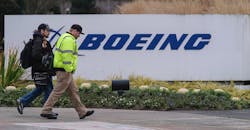Boeing Machinists to Vote on New Contract Wednesday
Over a month into their strike, Boeing workers represented by the IAM have a new tentative agreement in front of them. According to the International Association of Machinists and Aerospace Workers, the 33,000 striking workers will vote to accept the new contract or continue striking Wednesday, October 23.
UPDATE: Boeing Machinists Reject New Contract
The latest proposal before the workers would increase salaries by 35% over the four-year life of the contract, a $7,000 ratification bonus, restored incentive pay, and up to a 12% increase in company contributions to employee 401(k) retirement plans.
By comparison, Boeing’s initial September 12 offer, soundly rejected by the union on September 13, included a 20% pay increase, but cut incentive pay. A previous Boeing offer, made September 23, included a 30% pay increase, but was not negotiated with the IAM and did not receive a vote.
In a statement released Saturday, October 19, the IAM 751 local’s negotiating team credited U.S. Acting Labor Secretary Julie Su for helping negotiate the latest proposal and said the contract’s fate was up to union member.
“We have received a negotiated proposal and resolution to end the strike, and it warrants presenting to the members and is worthy of your consideration,” the committee wrote, adding that a simple majority of 50% +1 of voting members will approve or reject the contract.
The latest news comes roughly 37 days into the strike, and roughly a week since Boeing CEO announced the company would seek to lay off 17,000 people, or 10% of its entire staff, including executive and white-collar workers, following an October 11 release showed a $5 billion loss for the aerospace company.
“Our business is in a difficult position, and it is hard to overstate the challenges we face together,” CEO Robert “Kelly” Ortberg” wrote in a memo accompanying the layoff announcement. In a statement, International IAM President Brian Bryant called the planned job cuts “Corporate greed at its worst.”
Ortberg’s diagnosis, however, is not controversial. Boeing has been flying through turbulence all year, thanks to lingering issues with its 737 MAX airliner and Starliner space capsule.
Following the tragic crashes of two 737 MAX airliners due to a faulty crash-prevention system in 2019, Boeing had to deal with more fallout around the model when a fuselage panel blew out on a 737 MAX owned by Alaska Airlines shortly after takeoff, necessitating an emergency landing.
In May, NASA delayed a planned manned launch of Boeing’s Starliner crew module two hours before liftoff to replace a pressure regulation valve. After the Starliner went up on June 6, carrying two astronauts to the International Space Station, six of its thrusters malfunctioned on approach to the ISS. In August, NASA elected not to use the Starliner to return the two astronauts to earth, opting instead to extend their mission through January 2025.
On September 20, CEO Ortberg issued two memos that nicely encapsulate Boeing’s current situation. In the first, he announced the departure of Ted Colbert, head of Boeing’s defense, space and security subdivision. In the other, Ortberg said that ending the IAM strike was “a top priority.”
About the Author
Ryan Secard
Associate Editor
Ryan Secard joined Endeavor B2B in 2020 as a news editor for IndustryWeek. He currently contributes to IW, American Machinist, Foundry Management & Technology, and Plant Services on breaking manufacturing news, new products, plant openings and closures, and labor issues in manufacturing.
